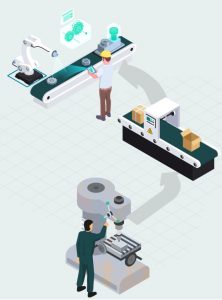See and be seen
Building a Compelling Online Presence

The evolution of marketing in the manufacturing sector
Empowering manufacturing change with innovation in marketing
The world of buying and selling has changed, and even traditional industries cannot escape the radical transformation of the global market. The need for innovation as a way to preserve and add value is now greater than ever.
The manufacturing sector invests less than 2% of its revenue in IT initiatives. That’s far below the 3.28% average across all industries. Despite that, investment in new technologies, such as robotic process automation (RPA) and predictive maintenance, continues to grow across the manufacturing sector.
Marketing, however, has long taken a backseat. Many manufacturers still don’t recognise the value in modern, technology-driven marketing. Instead, they rely heavily on direct distribution and dealer contracts for growth. For most of them, marketing doesn’t extend beyond attending trade shows, maintaining their websites, or publishing the occasional brochure or whitepaper.
Digital marketing is where the real power lies. It is data-driven, and it has a potentially limitless reach across channels like email, social media, and pay-per-click (PPC) advertising. Digital campaigns can also be carried out at massive scale thanks to newer innovations like automation and artificial intelligence.

Why do manufacturers need digital marketing?
Yet digital marketing can also serve as a valuable strategic tool for empowering manufacturing change. With a scalable and strategic marketing effort, manufacturers can:
- Increase brand awareness beyond their regular distribution chains
- Reduce customer churn with personalised customer success and service
- Demonstrate their capabilities in front of a wider audience
- Nurture incoming leads with data-driven insights
- Identify new market opportunities with constant feedback loops
These are just a few of the ways a comprehensive digital strategy spanning sales, marketing, and customer service can drive growth in manufacturing. Instead of making decisions based on what they think will work for their leads and customers, manufacturers can make informed decisions based on the wealth of data-driven insights available to them.
To make it happen, manufacturers first need to overcome the widespread misconception that, if they build something, customers will come. Of course, product innovation remains squarely at the heart of everything a manufacturing company does, but that doesn’t mean marketing shouldn’t be an integral part of that innovation process.
Here are three things marketing teams in manufacturing companies should be able to do:
Growing customers with business intelligence
Combined with the efforts and responsibilities of sales and customer service teams, marketers have two key goals – acquire new customers and grow existing ones. Business intelligence (BI) solutions use AI-driven analytics to deliver crucial insights into customer behaviour and identify new sales opportunities. Business intelligence can help seek out the most promising leads, identify customers who are at risk of defecting to a competitor and find opportunities to upsell or cross-sell to existing clients. BI makes it possible to achieve these things at massive scale too.
Establishing a competitive advantage
Clients and distributors demand greater efficiency and productivity. Price alone is no longer a strong enough competitive advantage, hence the need for manufacturers to differentiate their offer using modern, digitally-driven experiences. To fill unserved or underserved gaps in the market, manufacturers need to think about ways they can set themselves apart from their less innovative competitors. Some examples include speed order processing via digital platforms incorporating digital signatures and contracts or, for marketing, launching digital showrooms and using new techs like virtual and augmented reality to bring new products to life.
Personalising the customer experience
Manufacturers traditionally build their brands based on products, but digital marketing is more about emotions. Instead of producing products for a largely anonymous market, manufacturing firms should focus on learning about their customers and implementing personalised customer experiences with the help of an optimal combination of data-driven automation and direct human involvement. By getting to know their customers, manufacturers can tap into their needs and desires and leverage those insights into product innovation.
Final words
Digital transformation is the key to success and growth in the manufacturing sector, and it’s not all about product innovation either. By bringing together sales, marketing, and customer service under an organisation-wide digital strategy, manufacturers can fuel product innovation, enable continuous improvement, and grow their customers at the same time.
